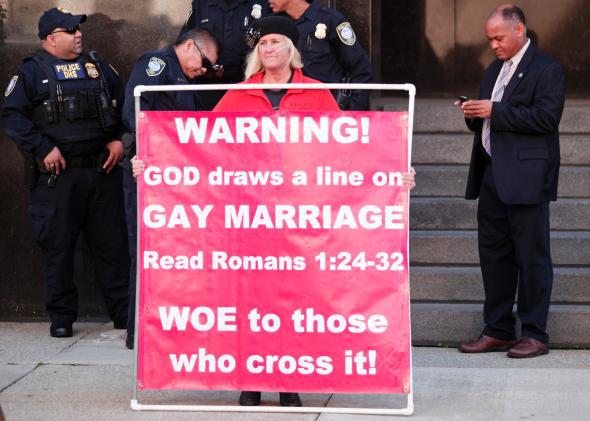On Friday, Brandon Ambrosino penned a thoughtful essay in the Atlantic contending that opposition to gay marriage doesn’t necessarily signify homophobia. Ambrosino’s argument runs in a few different directions, but it’s essentially a riff on the old saw “love the sinner, hate the sin.” Ambrosino claims that “gayness is not the most fundamental aspect of my identity” and that opponents of gay marriage can still make a good-hearted “distinction between Brandon and Gay Brandon,” loving the former while disapproving of the latter. This is an interesting point. It is also incorrect.
The primary problem with this kind of argument is that as easily as it can be trussed up in calls for tolerance, patience, and humanism, it can also be ripped to shreds by one simple question: Can a person oppose equal rights for gay people and not be, in some fundamental way, a homophobe? The answer seems to me to be a pretty obvious no. Opposition to gay marriage isn’t just some abstract principle with little practical effect. It’s a harmful belief with real-world consequences, and it has contributed immeasurable pain, sorrow, and suffering to the lives of gay people throughout history. To oppose gay marriage is to help prevent loving couples from visiting each other in the hospital, from raising a child together, from enjoying the most basic facets of a fulfilling life. And just as perniciously, in the words of the Supreme Court, opposition to marriage equality “humiliates tens of thousands of children now being raised by same-sex couples” by telling them their parents don’t deserve the dignity and respect afforded to straight couples. Those who oppose gay marriage drive the laws that inflict this daily humiliation unto gay couples and their children. That, put simply, is homophobia.
A classic analog will throw this point into even sharper relief. It would be odd, even risible, to argue that opposition to interracial marriage didn’t hinge on racism. Imagine Ambrosino’s arguments transposed to that context: Would anyone in 2013 seriously argue that we should separate one’s race from one’s broader self? That because race “is not the most fundamental aspect” of one’s identity, opposing legal recognition of interracial marriages is somehow not malicious? Of course not; such an argument is clearly intellectually untenable. The only reason the argument holds any water in the gay marriage context is because on some level, most gay marriage opponents refuse to see homosexuality as an intrinsic aspect of one’s identity. Rather than view homosexuality as something you are, these people view it as something you do—a disordered behavior, perhaps one that can be cured. Such warped logic can make Ambrosino’s argument seem airtight, so long as one accepts that deeply homophobic premise at the outset.
Yet it’s worth stripping away the fallacies from Ambrosino’s claim to examine what I take to be his broader point: that name-calling and vilification do no good for the gay rights movement. Calling a gay marriage opponent a bigot with hateful beliefs only provides his side with more fodder to claim that equality proponents are the true intolerant bullies. After years of traumatic victimization, the impulse to be brutally frank with equality opponents is certainly tempting. But the path to change is through understanding and equanimity, not animus and anger. Just because somebody is a homophobe doesn’t mean you have to call him that. And doing so will only spur him to dig in his heels.
Ambrosino, whose father is a devout Christian pastor, grasps this fact—which is good, because it’s the only issue that matters in the whole debate. Rounding someone up to a homophobe is just a matter of labeling; convincing him to change his mind is a matter of vital importance to the gay rights movement. (Just ask Rob Portman.) Proponents of equality reached 2013’s dizzying heights only after years of painstaking patience and calm perseverance, and that is the only strategy that will win over the remaining holdouts. We don’t need to prove to gay marriage opponents that their beliefs are hateful. We need only prove that their beliefs are wrong.
